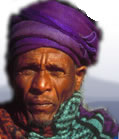THEMES IN THIS
TESTIMONY
Agriculture

Development

Economics

Environment

Food Security

Gender

Land

Livestock

Migration

Resettlement

Social Relationships

Click on arrows
to find more
testimonies
featuring
these themes
|
|
Sex
|
male
|
|
|
Age
|
67
|
|
|
Occupation
|
priest
|
|
|
Location
|
Guranboba Monastery (highlands)
|
|
|
Date
|
December 1997
|
|
summary
The narrator is a widower with grown-up children. His view on modern education is interesting, and he talks of envying his son who has been sent to school in Addis Ababa: “...I wish I had learnt like him...[modern education] is better than priesthood...[it] is useful.” It’s a pity that the narrator wasn’t asked more about being a priest and what it involved. Generally there is not a great deal of personal information, which is true of this collection in general, and answers are short.
detailed breakdown
|
You will need a password from Panos to view the full
transcript of the interview. To apply for a password, click here.
Once you have a password, click here to go to the beginning
of the transcript. You can also click on any section of the
breakdown of content below and go straight to the
corresponding part of the transcript.
|
| Section 1-2 |
Erosion, degradation of land, hardship. Conditions in the past. Changes in crop cultivation. Brief mention of pests.
|
| Section 3 |
Land redistribution. Distance from nearest markets – people have to walk in the burning sun. Rise in prices. No development activities or health services: “Nobody came to this desert land.”
|
| Section 4 |
The future – narrator unwilling to enquire into “God’s ways” and attempt to predict what will happen.
Brief mention of various social institutions. Age of marriage, dowry, divorce.
|
| Section 5 |
“Unattached women”. Relationship between Christians and Muslims: “did not have a harmonious relationship in the past, but now they are like children from the same mother”. Relations with blacksmiths/artisans.
|
| Section 6 |
Men and women and their roles: “The men held the upper hand and the women were subordinate in the past. Now they are equal.” However, he then says women are still obedient to men and wash their feet.
Care of disabled members of the community.
|
| Section 7 |
No intention to leave the area: “I don’t want to be separated from my children and my people. It is our culture.” Reasons why people settled in the highlands. Traditional holidays.
|
| Section 8-9 |
Views on education – son is educated and earning a good living in Addis Ababa. Usefulness of radio.
Diseases – those prevalent in the past no longer exist; AIDS and how to stop it. Population growth and control – government should provide contraceptives.
|
| Section 10-11 |
Drought and food aid. Selling livestock to feed family. Seasonal migration. Food consumption, past and present.
“Solution” for the future – rain, but only God can send this. |
|


